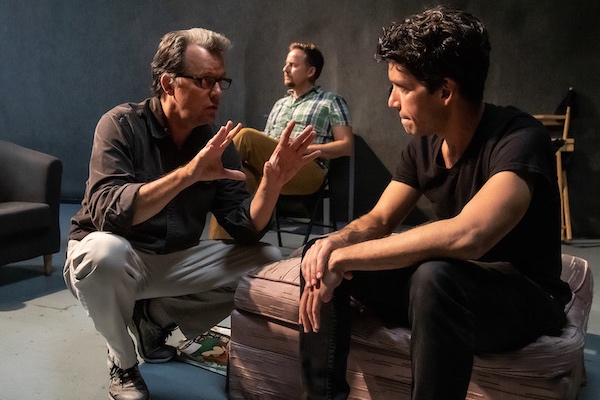'Handjob' playwright spills all
(c) LosAngelesBlade.com
September 6, 2019
| By John Paul King As a summer winds down that has already brought a gay porn musical and dark comedy about transgender sex workers to the stages of LA, the Echo Theater Company is preparing to offer up a play called 'Handjob.' In it, a middle-aged gay writer hires a younger man as a "shirtless" cleaner, and their transactional relationship calls up questions about racism, homophobia, and issues of consent. As the Theater’s official synopsis puts it, it’s a dark comedy that "explores the deepest sensitivities in our culture — with unexpected and hilarious consequences." If you have any doubt this will be a provocative evening of theatre, consider that the press release also includes a "mature content" warning that promises "graphic adult content including male nudity." The show, directed by Chris Fields, comes from the imagination of Erik Patterson, an Ovation-nominated, boundary-pushing gay playwright who also happens to be an Emmy-nominated and WGA-winning screenwriter of TV content aimed at young adults. The Blade sat down with Patterson for a Q&A about what the writer of "Another Cinderella Story" is trying to do with a play called 'Handjob.'
LOS ANGELES BLADE: Can you expand a little on the synopsis? Without giving anything away, of course. ERIK PATTERSON: As 'Handjob' progresses, it constantly reveals itself. I want to let the play tell the audience what it is, so I won’t go too deep into the plot. But here’s what I can say: the play starts with two men in a New York City apartment. There’s an older gay white man and a younger straight black man. A transaction takes place, which they define in fundamentally different ways, and that leads to… well, the play’s called 'Handjob,' so… You know what Chekhov said about guns, right? If you introduce a gun in Act One, then it better go off in Act Three. Well, instead of Chekhov’s gun, we have Chekhov’s handjob. If you’re gonna promise a handjob in the title of the play, then that gun better go off. BLADE: This play seems to address today’s environment of identity politics and "call-out culture." How much did that intention inform the process of writing it? PATTERSON: My sexuality informs how I see the world. And acknowledging privilege is important. I’m gay, yes, but I’m also a white male, and I’ve benefitted from that privilege. If I pretend that’s not true, then I’m part of the problem. The more layers of privilege you have, the more you need to sit back and listen. There is a call to action in this play: listen more. There are a lot of privileged people out there who refuse to grow and adapt. Listening is not a passive act. Privileged people who don’t see their privilege deserve to be called out. 'Handjob' speaks to that directly. BLADE: How difficult is it to negotiate the minefield such a cultural context creates for an artist? PATTERSON: We’re all fallible, we all make mistakes. But again, we’ve got to learn from those mistakes. I think of 'Handjob'as a "fight play," the characters get into several big arguments. And there are moments in the play when each one of them is right – and then moments when they each go too far, when they say the wrong thing. Moments where each character steps directly on a landmine, so to speak. That’s one of the things I wanted to explore in this play: how do we learn from our mistakes? BLADE: You seem to have managed to build two successful careers as a writer, one creating television for younger viewers and one as a playwright crafting edgy theatre. Can you talk a little bit about how much overlap there is between the two? Both creatively and in terms of entertainment industry "politics?" PATTERSON: Compartmentalization! I like to say I write princess movies for kids and plays about fucked up people for adults. But that’s a simplification. I don’t like to be pinned down by one, or even two, genres. I’ve been fortunate to make a living writing kids’ movies and rom-coms and genre stuff, and the plan is to keep branching out by telling different stories. My writing partner (who I do my film and TV with) and I are currently writing an action comedy, a period drama, and teen soap opera. The key to any genre is crafting compelling characters an audience will invest in. One of the things that makes 'Handjob' successful is: every character on that stage has a strong point of view. If I’ve done my job correctly, the audience will go back and forth in terms of who they identify with most. BLADE: We’re not asking you to interpret your work for us, or to give us any spoilers, but can you talk about what reactions you’re hoping to evoke from audiences with 'Handjob,' and a little bit about the approach you took to facilitate that? PATTERSON: I hope people walk out of the theater and feel compelled to go to a bar or a late-night restaurant because they need to continue arguing the ideas brought up in the play. BLADE: Is this play going to make people angry? PATTERSON: I hope so. |
Unless otherwise noted, all captures were made by me from videos from various sources. All shows and photos belong to their respective owners.
NO COPYRIGHT INFRINGEMENT INTENDED!
© 2004-2022 SConTV.com and Steven-Culp.com
